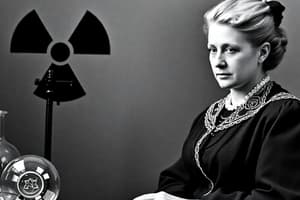Podcast
Questions and Answers
What motivated Marie Curie to pursue research in radioactivity?
What motivated Marie Curie to pursue research in radioactivity?
- Henri Becquerel's groundbreaking discovery of the phenomenon. (correct)
- The need to find a cure for her sister's illness.
- A childhood fascination with the properties of uranium.
- A desire to win a Nobel Prize.
What was a significant barrier Marie Curie faced in her early life?
What was a significant barrier Marie Curie faced in her early life?
- Lack of access to formal laboratory equipment and poor research funding.
- Her family's disapproval of her pursuit of a scientific career and their desire that she become a governess.
- Gender discrimination in education which prevented her from attending college due to being a woman. (correct)
- A chronic illness that hindered her ability to conduct extensive laboratory work.
What contribution from Marie Curie significantly advanced cancer treatment?
What contribution from Marie Curie significantly advanced cancer treatment?
- The development of a novel surgical technique for removing cancerous tumors called Atomic Physics.
- The isolation of radium, in collaboration with André-Louis Debierne, and using it in radiotherapy. (correct)
- The invention of a device to measure radiation levels, which aided in diagnosing cancer.
- The discovery of polonium, which was initially used in early forms of chemotherapy.
What was the name of the scientist Marie Curie shared her first Nobel Prize award with?
What was the name of the scientist Marie Curie shared her first Nobel Prize award with?
In what year did Marie Curie and her husband discover polonium and radium?
In what year did Marie Curie and her husband discover polonium and radium?
What field of study was Marie Curie significantly responsible for founding?
What field of study was Marie Curie significantly responsible for founding?
What was a defining trait of Pierre Curie's career mentioned in the context of Marie Curie's biography?
What was a defining trait of Pierre Curie's career mentioned in the context of Marie Curie's biography?
What honor made Marie Curie the first person to achieve it?
What honor made Marie Curie the first person to achieve it?
What term did Marie Curie create to describe the phenomenon she studied?
What term did Marie Curie create to describe the phenomenon she studied?
What was the main focus of Marie Curie's career?
What was the main focus of Marie Curie's career?
Flashcards
Marie Curie's Birth
Marie Curie's Birth
Marie Curie was born Maria Sklodowska in 1867 in Warsaw, Poland.
Education Challenges
Education Challenges
Marie studied in secret since women couldn't attend college in Poland.
Discovery of Polonium and Radium
Discovery of Polonium and Radium
In 1898, Marie and Pierre discovered polonium and radium while analyzing pitchblende.
Nobel Prize in Physics
Nobel Prize in Physics
Signup and view all the flashcards
Radioactivity
Radioactivity
Signup and view all the flashcards
Radiotherapy Contribution
Radiotherapy Contribution
Signup and view all the flashcards
Multiple Nobel Prizes
Multiple Nobel Prizes
Signup and view all the flashcards
Pierre Curie's Role
Pierre Curie's Role
Signup and view all the flashcards
Field of Atomic Physics
Field of Atomic Physics
Signup and view all the flashcards
Legacy in Science
Legacy in Science
Signup and view all the flashcards
Study Notes
Marie Curie: A Pioneer in Radioactivity
- Marie Curie was a passionate, dedicated scientist who revolutionized knowledge about radioactivity
- Her work laid the foundation for radiotherapy's cancer treatment use
- Curie was born Maria Skłodowska in Warsaw, Poland in 1867
- Her family lost two members early on
- Polish women were not permitted college education at the time
- Curie studied in secret, working as a governess
- Earned degrees in physics and mathematics
- Met and married physicist Pierre Curie
- Their collaboration was significant in the field of radioactivity
Key Discoveries and Achievements
- Fascinated by Henri Becquerel's discovery of radioactivity, Curie and Pierre focused research on the phenomenon
- Discovered two new radioactive elements, polonium and radium, in uranium ore in 1898
- Their work revolutionized atomic physics
- Coined the term "radioactivity"
- Awarded the 1903 Nobel Prize in Physics for their work
- Pierre and Marie Curie were shared the award
- Also received a Nobel Prize in chemistry in 1911
Further Contributions
- Worked with a French chemist to isolate radium
- Radium's subsequent use in medical radiotherapy
- The first person to win two Nobel Prizes
Studying That Suits You
Use AI to generate personalized quizzes and flashcards to suit your learning preferences.





